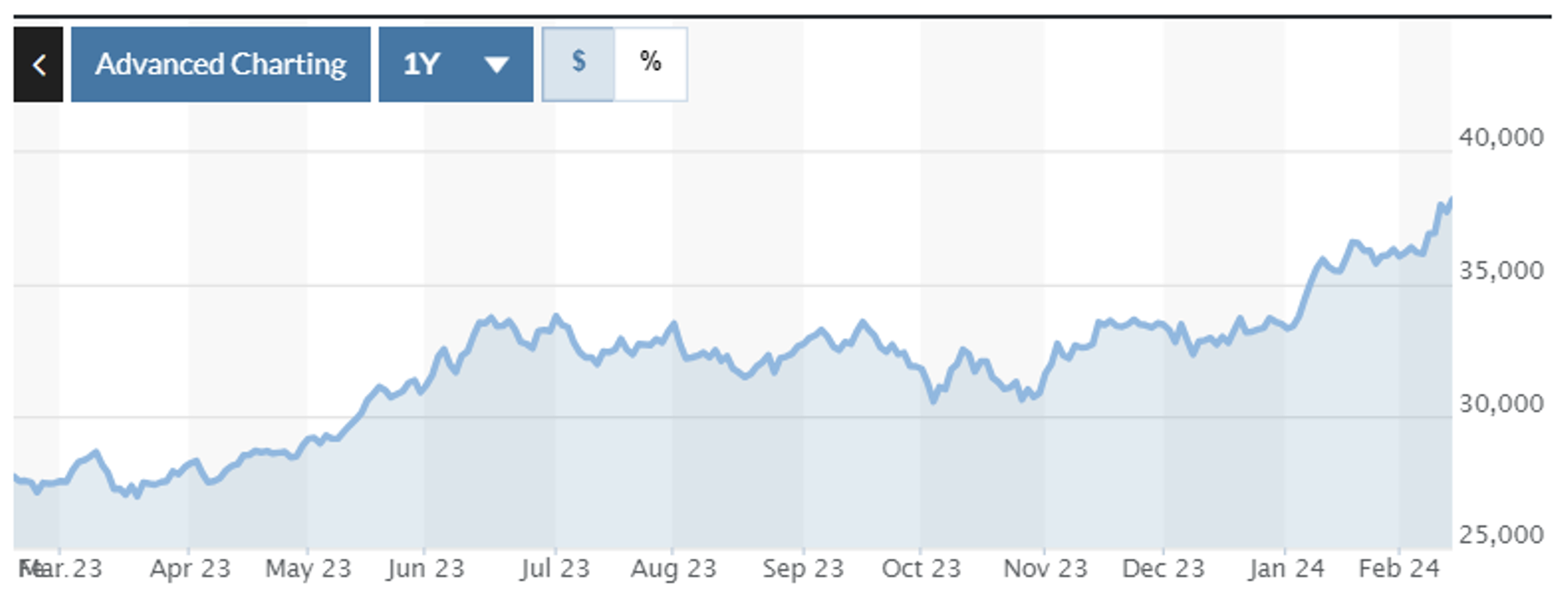The Good News for US Investors Regarding Japan's Recession

Last night, Japanese data showed a surprise drop in GDP for the last quarter. There is some debate about it these days, but most economists and observers still regard two consecutive negative GDP prints as evidence that a country is in recession. On that basis, Japan is in recession given that the 0.4% contraction in Q4 followed on a 1.9% decline in Q3. However, you wouldn’t know that if you look at the chart for Tokyo’s Nikkei Index over the last year:

Japanese stocks have been on a tear. They have risen by more than thirty percent over the last twelve months and are now nudging at their highs, highs that date as far back as 1990. If you believe politicians who point to the stock market when it is strong as evidence of a vibrant economy and therefore their own brilliance, you might look at that chart and conclude that Japan’s economy is absolutely humming.
Of course, you would be wrong. Japanese equities are approaching highs that many thought would never be seen again, but they're coming at a time when the economy is in recession. Japanese consumers are feeling the pinch and are cutting back on life's little luxuries. Granted, since those market highs were hit in 1990, the Japanese economy has not exactly been a powerhouse of growth. In fact, it has most usually been described using words like “moribund” and “stagnant,” but the reputation of the Japanese people as strong consumers had endured. As the above referenced article suggests, that is changing.
Corporations, on the other hand, have been doing just fine. Giant Japanese companies, the likes of Toyota, Sony, and Mitsubishi, are still experiencing a strong post-pandemic recovery, with input prices beginning to moderate, and the product price hikes that are squeezing consumers also increasing margins. Hence, the stock market is soaring.
There is a lesson in all this for U.S. investors. They should understand that when economists forecast a “mild recession” in America somewhere around the middle of the year, as many are currently doing, that isn’t necessarily a reason to sell stocks. The market can keep showing gains until then and, based on what is happening in Japan, even beyond should a recession arrive. In other words, as people who understand the way these things work are fond of saying, the stock market is not the economy.
What the market does is not a reflection of any one particular politician’s brilliance or even anything else political, either. It is simply a measure of the profitability and prospects of publicly listed companies and what people are paid to own a piece of them. Obviously, good economic conditions help with those things, but they aren’t the be all and end all. If a company can do what their Japanese counterparts are currently doing and increase margins to get through what will presumably be a temporary reduction in consumer and/or B2B spending, their prospects can be good based on an anticipated bounce back. That bounce back may or may not materialize, but the possibility of it is enough to keep stocks strong, even as an economy falters.
That is why U.S. stocks, like their Japanese counterparts, are at or near all-time highs despite some evidence here that the economy may be about to stumble. Traders and investors see that potential stumble as a temporary inconvenience that corporations will be able to ride out, and they are looking beyond that to an economic world where inflation is back under control and growth bounces back strongly. That is speculation, but speculating is what institutional traders and investors do and, as the Japanese example demonstrates, that speculation can buoy stocks even when a real recession comes.
The views and opinions expressed herein are the views and opinions of the author and do not necessarily reflect those of Nasdaq, Inc.
